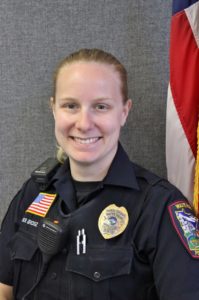by Heidi L. Everett
editor@thenewsleaders.com
In August 2020, Rebecca Grosz was named the first female sergeant of the Waite Park Police Department. A little over six months into her new role, this St. Joseph native shares a bit about her work.
Grosz’s reasons for wanting to be in law enforcement are personal. She grew up in St. Joseph from the time she was 5, and she remembers encounters with then-Chief Pete Jansky and other officers who were there at the time.
“When I saw them being able to help fix situations, I knew this is what I wanted to do,” she said.
Grosz got her start as a non-licensed community service officer in Elk River dealing with parking and animal control. In 2012, she joined Waite Park as a patrol officer where she spent five years responding to calls and traffic stops as well as working on investigations.
“Our patrol officers often work cases from start to finish,” she said. “We’re a small agency.”
In 2018, she traded the uniform for plain clothes to work as a general investigator. While she enjoyed the work, it added more time sitting at a desk than she wanted.
When she was promoted as the first female sergeant, she got to go back on the road. Her new leadership role includes supervision of three officers as well as oversight and input on the officer reserve program and field training program.
For as small as Waite Park is – just more than 7,600 – the police are kept busy.
“We have a small population, but during the day our population skyrockets to above 30,000 because of people interacting with the many businesses we have,” Grosz said. “The majority of our calls are affiliated with businesses.”
Grosz appreciates that no two days are alike.
“I love that it is always different,” she said. “Even if I go on a call today and tomorrow, they are never the same. You have to think through what you are doing in every situation and find different solutions.”
Grosz said there’s been everything from a pistol whipping incident, to a home invasion, to sex trafficking cases.
When asked about preparation for a career in law enforcement, Grosz said training is different than it was for her. One thing is for sure: don’t believe what you see on television.
“TV has made our job very, very difficult to be honest,” Grosz said, pointing out misperceptions about solving cases.
“Many people believe fingerprints will solve everything, and that solving cases is a 30-minute thing,” she said. “We can send evidence off, and it’s not coming back in an hour. At least daily, I explain that to somebody. It might take 3 to 6 months to get the information we need.”
In general, Grosz said to work hard and gain as much knowledge as possible about criminal procedure, case law and what you can and can’t do as an officer.
Most importantly, she said work on communication skills.
“I often get asked about how often I use my taser, but I use my mouth more. Our mouths are our most useful tool,” she said.
“I’m not a large person. I can hold my own. I don’t want to fight, but I will if I need to,” Grosz said. “To be able to communicate is more important than being able to use force.”





